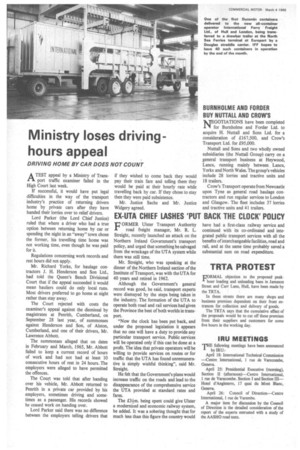EX-UTA CHIEF LASHES 'PUT BACK THE CLOCK' POLICY
Page 50

If you've noticed an error in this article please click here to report it so we can fix it.
FORMER Ulster Transport Authority road freight manager, Mr. R. L. Streight, recently launched an attack on the Northern Ireland Government's transport policy, and urged that something be salvaged from the wreckage of the UTA system while there was still time.
Mr. Streight, who was speaking at the dinner of the Northern Ireland section of the Institute of Transport, was with the UTA for 40 years and retired in 1962.
Although the Government's general record was good, he said, transport experts were dismayed by the steps being taken in the industry. The formation of the UTA to operate both road and rail services had given the Province the best of both worlds in transport.
"Now the clock has been put back, and under the proposed legislation it appears that no one will have a duty to provide any particular transport service. Public services will be operated only if this can be done at a profit. The idea that private operators will be willing to provide services on routes or for traffic that the UTA has found unremunerative is simply wishful thinking", said Mr. Streight.
He felt that the Government's plans would increase traffic on the roads and lead to the disappearance of the comprehensive service the UTA provided at standard rates and fares.
The L3frn. being spent could give Ulster a modernized and economic railway system, he added. It was a sobering thought that for much less than this figure the country would have had a first-class railway service and continued with its co-ordinated and integrated public transport services with all the benefits of interchangeable facilities, road and rail, and at the same time probably saved a substantial sum on road expenditure.
























































































































































